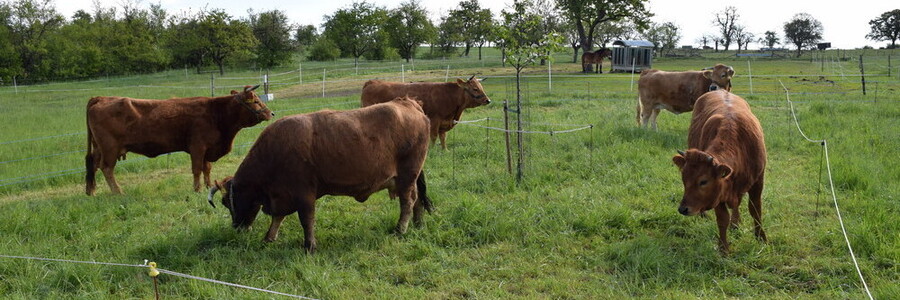Since December 2020, the Naturefund team has grown by a herd of five cows. The cattle belong to one of the oldest domestic breeds - the Murnau-Werdenfelser. With the acquisition of the herd, Naturefund is testing a grazing method with scientific support: holistic pasture management. This method is supposed to help build up humus in the soil and thus improve the soil. Thus, the animals are part of our vision for a new and more sustainable form of agriculture.
Nature-like grazing
The grazing concept of holistic pasture management involves herd animals grazing on a spatially limited area with a high stocking rate. This ensures that the cows eat up to about 40 % of the grass over the whole area. After a short time, the animals are moved to another area. A rest period follows for the previous grazing area, allowing the grass to recover.
Studies show that the root growth of grasses doubles when only about 30 to 40 percent is grazed. This also improves plant growth above ground, which has positive effects: the more plant mass that is created on the pasture, the more CO2 can be converted by the plants or stored in the soil.
Humus makes the soil fertile
Holistic pasture management also makes use of the trampling of the grasses and the fertilisation through excrement and urine. This is precisely what promotes the build-up of humus. Humus is the term used to describe the proportion of finely decomposed organic substances found in the soil. It is produced by the decomposition of dead vegetation by soil organisms. The bacteria, fungi and other microorganisms break down the organic compounds of the plant remains into minerals, making the soil fertile. This is because plants obtain their nutrients from minerals. Trampling the grasses over a wide area, as well as defecating on them, promotes the decomposition of the dead vegetation, making the soil more fertile. In addition, the trampled grasses act as a kind of mulch layer that keeps moisture in the soil. This helps to prevent the pasture soil from drying out.
Our vision
The current intensive agriculture threatens our biodiversity and has a long-term impact on climate change. With the method "Holistic Pasture Management" we would like to further develop our vision of a more sustainable agriculture that works in harmony with nature.

